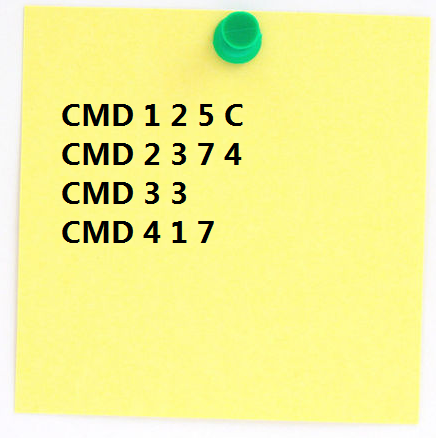Jimmy Blog
Welcome!
微软题:Combination Lock
题目
时间限制:10000ms
单点时限:1000ms
内存限制:256MB 描述


Finally, you come to the interview room. You know that a Microsoft interviewer is in the room though the door is locked. There is a combination lock on the door. There are N rotators on the lock, each consists of 26 alphabetic characters, namely, 'A'-'Z'. You need to unlock the door to meet the interviewer inside. There is a note besides the lock, which shows the steps to unlock it.
Note: There are M steps totally; each step is one of the four kinds of operations shown below:
Type1: CMD 1 i j X: (i and j are integers, 1 <= i <= j <= N; X is a character, within 'A'-'Z')
This is a sequence operation: turn the ith to the jth rotators to character X (the left most rotator is defined as the 1st rotator)
For example: ABCDEFG => CMD 1 2 3 Z => AZZDEFG
Type2: CMD 2 i j K: (i, j, and K are all integers, 1 <= i <= j <= N)
This is a sequence operation: turn the ith to the jth rotators up K times ( if character A is turned up once, it is B; if Z is turned up once, it is A now. )
For example: ABCDEFG => CMD 2 2 3 1 => ACDDEFG
Type3: CMD 3 K: (K is an integer, 1 <= K <= N)
This is a concatenation operation: move the K leftmost rotators to the rightmost end.
For example: ABCDEFG => CMD 3 3 => DEFGABC
Type4: CMD 4 i j(i, j are integers, 1 <= i <= j <= N):
This is a recursive operation, which means:
If i > j: Do Nothing Else: CMD 4 i+1 j CMD 2 i j 1For example: ABCDEFG => CMD 4 2 3 => ACEDEFG
输入
1st line: 2 integers, N, M ( 1 <= N <= 50000, 1 <= M <= 50000 )
2nd line: a string of N characters, standing for the original status of the lock.
3rd ~ (3+M-1)th lines: each line contains a string, representing one step.
输出
One line of N characters, showing the final status of the lock.
提示
Come on! You need to do these operations as fast as possible.
样例输入
7 4
ABCDEFG
CMD 1 2 5 C
CMD 2 3 7 4
CMD 3 3
CMD 4 1 7
样例输出
HIMOFIN
分析
本题是:环的思想+线段树。 具体解法参考:hihocoder
本题在处理cmd == 3的情况的时候,不需要移动字符串,而是采用“环”的思想,直接实现,处理i,j的时候直接加上start,再mod N:
int i, j;
cin >> i >> j;
i = (i - 1 + start + N) % N;
j = (j - 1 + start + N) % N;
if (i > j)
{
query4(i, N - 1, 1);
query4(0, j, N - i + 1);
}
else
query4(i, j, 1);
再这基础上,有两种解法,一种是普通的,不能AC。而另一种采用线段树,AC。
解法1:普通解法,复杂度O(nm)
#include <iostream>
#include <vector>
#include <string>
using namespace std;
int N, M;
vector<char> cs;
inline void transf(char &c, int i)
{
c = (c - 'A' + i + 26) % 26 + 'A';
}
void query1(int i, int j, int x)
{
for (; i <= j; i++)
cs[i] = x;
}
void query2(int i, int j, int k)
{
for (; i <= j; i++)
transf(cs[i], k);
}
void query4(int i, int j, int lev)
{
for (; i <= j; i++)
transf(cs[i], lev++);
}
int main()
{
//freopen("t.txt", "r", stdin);
cin >> N >> M;
cs.resize(N, '#');
for (int i = 0; i < N; i++)
cin >> cs[i];
string s;
int start = 0, cmd;
for (int m = 0; m < M; m++)
{
cin >> s >> cmd;
if (cmd == 1)
{
int i, j;
char x;
cin >> i >> j >> x;
i = (i - 1 + start + N) % N;
j = (j - 1 + start + N) % N;
if (i > j)
{
query1(i, N - 1, x);
query1(0, j, x);
}
else
query1(i, j, x);
}
else if (cmd == 2)
{
int i, j, k;
cin >> i >> j >> k;
i = (i - 1 + start + N) % N;
j = (j - 1 + start + N) % N;
if (i > j)
{
query2(i, N - 1, k);
query2(0, j, k);
}
else
query2(i, j, k);
}
else if (cmd == 3)
{
int in;
cin >> in;
start = (start + in + N) % N;
}
else if (cmd = 4)
{
int i, j;
cin >> i >> j;
i = (i - 1 + start + N) % N;
j = (j - 1 + start + N) % N;
if (i > j)
{
query4(i, N - 1, 1);
query4(0, j, N - i + 1);
}
else
query4(i, j, 1);
}
}
for (int i = start; i < start + N; i++)
cout << cs[i % N];
return 0;
}
解法2:线段树,复杂度O(mlogn)
调了很久才AC,原因:习惯不好,在写程序的时候,要把所有的都想清楚,在实现的时候,某个tag不产生作用,其它的与此相关的变量也需要清零,而 之前为了图一时的方便,没有清零,导致各种各样的错误。总之还是需要一个整体的思想,tag产生作用就把所有变量赋值,作用消失就清零。代码如下:
#include <iostream>
#include <vector>
#include <string>
using namespace std;
int N, M;
typedef struct Node{
char c;
int lt; //1 set, 2 level up, 4 increase up
int lev, delta, l, r, m;
Node *lc, *rc;
Node(char c, int l, int r) : c(c), l(l), r(r), m((l + r) / 2), lt(0), lev(0), delta(0), lc(NULL), rc(NULL){};
};
Node *root;
vector<Node*> nodes;
void build(Node * &p, int l, int r)
{
if (l == r)
p = nodes[l];
else
{
p = new Node('#', l, r);
build(p->lc, l, (l + r) / 2);
build(p->rc, (l + r) / 2 + 1, r);
}
}
void query(int cmd, Node *root, int i, int j, char x, int lev, int delta)
{
if (i == root->l && j == root->r)
{
if (cmd == 1)
{
root->lt = 1;
root->c = x;
root->lev = 0;
root->delta = 0;
}
else if (cmd == 2 || cmd == 4)
{
if (root->lt != 4)
root->lt = cmd;
if (x != '#')
{
root->c = x;
root->lev = lev;
root->delta = delta;
}
else
{
root->lev += lev;
if (cmd == 4)
root->delta += delta;
}
}
return;
}
if (root->lt != 0)
{
query(root->lt, root->lc, root->l, root->m, root->c, root->lev, root->delta);
query(root->lt, root->rc, root->m + 1, root->r, root->c,
root->lt == 4 ? root->lev + root->delta * (root->m - root->l + 1) : root->lev, root->delta);
root->lt = 0;
root->lev = 0;
root->c = '#';
root->delta = 0;
}
if (j <= root->m)
query(cmd, root->lc, i, j, x, lev, delta);
else if (i >= root->m + 1)
query(cmd, root->rc, i, j, x, lev, delta);
else
{
query(cmd, root->lc, i, root->m, x, lev, delta);
query(cmd, root->rc, root->m + 1, j, x, cmd == 4 ? lev + delta * (root->m - i + 1) : lev, delta);
}
}
void printc(Node *root, int i, int j)
{
if (root->lt != 0 && root->l == i && root->r == j && root->c != '#')
{
for (; i <= j; i++, root->lev += root->lt == 4 ? root->delta : 0 )
cout <<
(char)(root->lt == 1 ? root->c :
(
root->lt == 2 ? ((root->c - 'A' + root->lev + 26) % 26 + 'A')
: ((root->c - 'A' + root->lev + 26) % 26 + 'A')
)
);
return;
}
if (root->lt == 0 && root->l == root->r)
{
cout << root->c;
return;
}
if (root->lt != 0)
{
query(root->lt, root->lc, root->l, root->m, root->c, root->lev, root->delta);
query(root->lt, root->rc, root->m + 1, root->r, root->c,
root->lt == 4 ? root->lev + root->delta * (root->m - root->l + 1) : root->lev, root->delta);
root->lt = 0;
root->lev = 0;
root->c = '#';
root->delta = 0;
}
if (i > root->m)
printc(root->rc, i, j);
else if (j <= root->m)
printc(root->lc, i, j);
else
{
printc(root->lc, i, root->m);
printc(root->rc, root->m + 1, j);
}
}
int main()
{
//freopen("t.txt", "r", stdin);
cin >> N >> M;
for (int i = 0; i < N; i++)
{
char c;
cin >> c;
nodes.push_back( new Node(c, i, i));
}
build(root, 0, N - 1);
int start = 0;
for (int n = 0; n < M; n++)
{
int cmd;
string s;
cin >> s >> cmd;
if (cmd == 1)
{
int i, j; char x;
cin >> i >> j >> x;
i = (i - 1 + start + N) % N; j = (j - 1 + start + N) % N;
if (i > j)
{
query(cmd, root, i, N - 1, x, 0, 0);
query(cmd, root, 0, j, x, 0, 0);
}
else
query(cmd, root, i, j, x, 0, 0);
}
else if (cmd == 2)
{
int i, j, k;
cin >> i >> j >> k;
i = (i - 1 + start + N) % N; j = (j - 1 + start + N) % N;
if (i > j)
{
query(cmd, root, i, N - 1, '#', k, 0);
query(cmd, root, 0, j, '#', k, 0);
}
else
query(cmd, root, i, j, '#', k, 0);
}
else if (cmd == 3)
{
int in;
cin >> in;
start = (start + in + N) % N;;
}
else if (cmd == 4)
{
int i, j;
cin >> i >> j;
i = (i - 1 + start + N) % N; j = (j - 1 + start + N) % N;
if (i > j)
{
query(cmd, root, i, N - 1, '#', 1, 1);
query(cmd, root, 0, j, '#', 1 + N - i, 1);
}
else
query(cmd, root, i, j, '#', 1, 1);
}
}
if (start == 0)
printc(root, 0, N - 1);
else
{
printc(root, start, N - 1);
printc(root, 0, start - 1);
}
return 0;
}